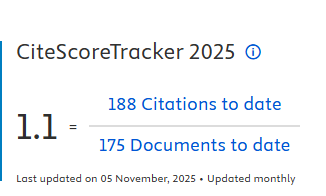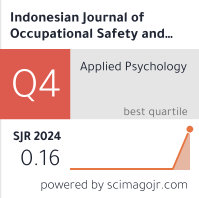Individual, Work, and Financial Factors on Job Satisfaction and Remaining as a Midwife
Downloads
Introduction: The delivery of health services at mother and child hospitals involves the midwife's role. Midwives are more responsible for providing patient care when faced with high Bed Occupation Rate (BOR) situations and emergency cases. However, several factors can affect midwives' turnover rates in hospitals. Purpose: This study aimed to analyze the relationship between individual factors (age, marital status, education level, years of service, and employment status), work factors (workload, work environment, and work stress), and financial compensation on job satisfaction and intention to leave midwives as well as recommendations for reducing turnover rates. Methods: This study was conducted at the Trisna Medika Women and Children Hospital, Tulungagung, Indonesia, in April 2022. The questionnaires were distributed to 65 respondents. The research results were analyzed using the partial least squares (PLS)Structural Equation Model (SEM) method. Results: Individual factors had no significant effect on job satisfaction or intention to leave. The variables that directly affect the intention to leave (medium) are workload, financial compensation (strong), and job satisfaction (medium). Job satisfaction is directly affected (moderately) by financial compensation and work stress. The indirect effect shows a significant relationship between job stress and job satisfaction in the work environment. Conclusion: The direct effect of financial compensation on intention to leave was stronger than the effect of financial compensation on job satisfaction.
Abate, H. K. and Mekonnen, C. K. (2021) ‘Job Satisfaction and Associated Factors Among Health Care Professionals Working in Public Health Facilities in Ethiopia: A Systematic Review', Journal of Multidisciplinary Healthcare, 14, pp. 821–830.
Abdillah, H. (2017) ‘Pengaruh lingkungan kerja terhadap kepuasan kerja perawat di ruang rawat inap Rumah Sakit Umum Daerah Cibabat Kota Cimahi Tahun 2016', LENTERA: Jurnal Ilmiah Kesehatan dan Keperawatan, 2(1), pp. 17–27.
Adegoke, A. A. et al. (2015) ‘Job Satisfaction and Retention of Midwives in Rural Nigeria', Midwifery, 31(10), pp. 946–956.
Agustin, D. I. (2018) ‘Pengaruh Kompensasi Finansial Langsung Terhadap Turnover Intention Dengan Kepuasan Kerja Sebagai Variabel Intervening (Pada Ratu Swalayan Dampit Kabupaten Malang)', Manajemen Bisnis, 8(2), pp. 75-83.
Ardan, M. and Jaelani, A. (2021) Manajemen Sumber Daya Manusia: Turnover Intention Dapat Mempengaruhi Kulaitas Kinerja Perusahaan. CV. Pena Persada.
Barahama, K. F., Katuuk, M. and Oroh, W. M. (2019) ‘Hubungan Beban Kerja dengan Kepuasan Kerja Perawat di Ruangan Perawatan Dewasa RSU Gmim Pancaran Kasih Manado', Jurnal Keperawatan, 7(1), pp. 1-8.
Das, T. et al. (2021) ‘Sustainable Development Goal 3: Good Health and Well-being', in South-East Asia Eye Health, pp. 61–78.
Denton, J., Evans, D. and Xu, Q. (2021) ‘Older Nurses and Midwives in the Workplace: A Scoping Review', Collegian, 28(2), pp. 222–229.
Deswarta, D. and Mardiansah, A. (2021) ‘Pengaruh Stres Kerja dan Kepuasan Kerja Terhadap Turnover Intention Perawat Rumah Sakit Prima Pekanbaru', E-Bisnis: Jurnal Ilmiah Ekonomi dan Bisnis, 14(2), pp. 58–63.
HakemZadeh, F. et al. (2021) ‘Does an Alignment of Employment Policies and Individual Preferences Affect Intention to Stay in the Profession? Evidence from Canadian Midwives', Health Policy, 125(4), pp. 450–458.
Hansson, M. et al. (2022) ‘Job Satisfaction in Midwives and Its Association with Organisational and Psychosocial Factors at Work: A Nation-Wide, Cross-Sectional Study', BMC Health Services Research, 22(1), p. 436.
Hardjanti, I. W., Noermijati and Dewanto, A. (2017) ‘Influence of Quality of Work Life towards Psychological Well-Being and Turnover Intention of Nurses and Midwives in Hospital', Kesmas, 12(1), pp. 7–14.
Harvie, K., Sidebotham, M. and Fenwick, J. (2019) ‘Australian Midwives' Intentions to Leave the Profession and the Reasons Why', Women and Birth, 32(6), pp. e584–e593.
Hastings-Tolsma, M. et al. (2021) ‘Experience of Midwives in Providing Care to Labouring Women In Varied Healthcare Settings: A Qualitative Study', Health SA Gesondheid, 26(Un 2015), pp. 1–12.
JasiÅ„ski, A. M., Derbis, R. and Walczak, R. (2021) ‘Workload, Job Satisfaction and Occupational Stress in Polish Midwives Before and During the Covid-19 Pandemic', Medycyna Pracy, 72(6), pp. 623–632.
Kabbash, I. A. et al. (2020) ‘Job Satisfaction among Physicians in Secondary and Tertiary Medical Care Levels', Environmental Science and Pollution Research, 27(30), pp. 37565–37571.
Khosravi, S. et al. (2022) ‘Strategies to improve the quality of midwifery care and developing midwife-centered care in Iran: analyzing the attitudes of midwifery experts', BMC Pregnancy and Childbirth, 22(1), p. 40.
Kjosavik, S. R. (2018) ‘Ongoing Recruitment Crisis in Norwegian General Practice', Scandinavian Journal of Primary Health Care, 36(2), pp. 107–108.
Lestari, N. N. Y. S. and Mujiati, N. W. (2018) ‘Pengaruh Stres Kerja, Komitmen Organisasi, dan Kepuasan Kerja Karyawan terhadap Turnover Intention'. E-Jurnal Manajemen Unud, 7(6), pp. 3412-3441.
Mahadewi, M. C. and Rahyuda, A. G. (2020) ‘Peran Kepuasan Kerja Dalam Memediasi Pengaruh Work Family Conflict Dan Kompensasi Terhadap Turnover Intention', Buletin Studi Ekonomi, 25(2), pp. 207-234.
Maulidah, K., Ali, S. and Pangestuti, D. C. (2022) ‘Pengaruh Beban Kerja dan Kepuasan Kerja terhadap Turnover Intention Karyawan RSU "ABC” Jakarta Selatan', Jurnal Akuntansi, Keuangan, dan Manajemen, 3(2), pp. 159–176.
Moradali, M. R. et al. (2022) ‘Job Satisfaction and its Related Factors in Midwives Working in the Health Services System in Iran : A Systematic Review'.
Muluneh, M. D. et al. (2022) ‘Midwives' Job Satisfaction and Intention to Leave their Current Position in Developing Regions of Ethiopia', Women and Birth, 35(1), pp. 38–47.
Perry, L. et al. (2017) ‘Health, Workforce Characteristics, Quality of Life and Intention to Leave: The "Fit For The Future” Survey of Australian Nurses and Midwives', Journal of Advanced Nursing, 73(11), pp. 2745–2756.
Piotrowski, A. et al. (2022) ‘Resilience, Occupational Stress, Job Satisfaction, and Intention to Leave the Organization among Nurses and Midwives during the COVID-19 Pandemic', International Journal of Environmental Research and Public Health, 19(11), pp. 1-16
Putra, M. F. R. (2017) ‘Pengaruh kepuasan kerja dan komitmen organisasi terhadap intention to leave di rumah sakit pura raharja surabaya', Jurnal Administrasi Kesehatan Indonesia, 5(2), pp. 99–104.
Rachmawati, K. V., Mulwaningsih, T. and Susilowati, T. (2019) ‘Karakteristik Pekerjaan dan Karakteristik Individu Terhadap Kepuasan Kerja Pegawai', Journal of Chemical Information and Modeling, 53(9), pp. 1689–1699.
Rahman, R. A., Purwanti, R. S. and Yustini, I. (2019) ‘Pengaruh Kompensasi Dengan Konsep Pay For Position Dan Konsep Pay For Competence Terhadap Kepuasan Kerja (Asn) Di Rsud Kabupaten Ciamis', Business Management and Entrepreneurship Journal, 1(4), pp. 60–74.
Sakul, A. (2018) ‘Pengaruh Kepuasan Kerja, Beban Kerja Dan Komitmen Organisasi Terhadap Turnover Intention Perawat RS. Bhayangkara TK. III Manado', Jurnal Riset Bisnis dan Manajemen, 6(2), pp. 175–184.
Sigurdsson, E. L. (2021) ‘The Wellbeing of Health Care Workers', Scandinavian Journal of Primary Health Care, pp. 389–390.
Silaban, N. and Syah, T. Y. R. (2018) ‘The Influence of Compensation and Organizational Commitment on Employees' Turover Intention', IOSR Journal of Business and Management, 20(3), pp. 1-6.
Simanjuntak, P. O. H. L., Simanjorang, A. and Amirah, A. (2021) ‘The Influence of Individual Characteristics, Organizational Factors and Job Satisfaction on Nurse Performance', Journal of Asian Multicultural Research for Medical and Health Science Study, 2(3), pp. 27–38.
Sinaga, S. (2020) ‘Peranan Balas Jasa dan Insentif Terhadap Motivasi Kerja pada PT. Sony Gemerlang Medan', Jurnal Darma Agung, 28(1), pp. 132–144.
Stoll, K. and Gallagher, J. (2019) ‘A Survey of Burnout and Intentions to Leave the Profession Among Western Canadian Midwives', Women and Birth, 32(4), pp. e441–e449.
Sumual, T. E. M. (2017) ‘Manajemen Sumber Daya Manusia', Edisi Revisi. Surabaya: CV. RA De. Rozarie.
World Health Organization (2022) Nursing and Midwifery.
Wicaksono, D. D. (2022) ‘Pengaruh Job Satisfaction dan Work Family Conflict terhadap Turnover Intention dan Komitmen Organisasi', Nomicpedia: Journal of Economics and Business Innovation, 2(2), pp. 120–128.
Zhang, W. et al. (2018) ‘The Influence of Professional Identity, Job Satisfaction, and Work Engagement on Turnover Intention among Township Health Inspectors in China', International Journal of Environmental Research and Public Health, 15(5), p. 988.

This work is licensed under a Creative Commons Attribution-NonCommercial-ShareAlike 4.0 International License.

In order to be accepted and published by The Indonesian Journal of Occupational Safety and Health, Author(s) who submit an article should complete all the review process. The copyright of received articles assigned to the The Indonesian Journal of Occupational Safety and Health and Department of Safety and Health, Universitas Airlangga as publishers of the journal. The intended copyright includes the rights to publish articles in various forms (including reprints).
The Editorial Team of The Indonesian Journal Of Occupational Safety and Health and Department of Safety and Health strive to ensure that no errors occur in the articles that have been published, both data errors and statements in the article.
Users of this website will be licensed to use materials from this website following the Creative Commons Attribution-NonCommercial-ShareAlike 4.0 International License. No fees charged. Please use the materials accordingly.
------------------------------------------------------------------------------------------------------------------------------------------------------------------------------------------
Attribution ” You must give appropriate credit, provide a link to the license, and indicate if changes were made. You may do so in any reasonable manner, but not in any way that suggests the licensor endorses you or your use.
NonCommercial ” You may not use the material for commercial purposes.
ShareAlike ” If you remix, transform, or build upon the material, you must distribute your contributions under the same license as the original.







 How to Submit Articles in OJS
How to Submit Articles in OJS

























